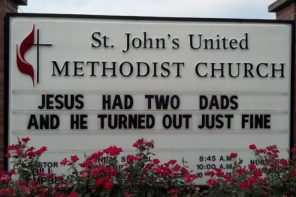Thinking a little more about my post yesterday on Terry Mattingly’s false story about the United Church of Church, I want to put on my churchman’s hat and reflect a bit.
It’s often difficult for people to grok what congregational polity means to the UCC, among other denominations. It’s not just an organizational method: it’s a basic principle of our faith that we are allowed—and we allow others—to follow their conscience. Each community defines for itself how it wants to express its faith, with the only real boundary being that we are in fact trinitarian Christians. (Otherwise we would be Unitarians and/or Universalists, by definition.)
This is again more than just structural, it’s a matter of justice. As one commentor pointed out, her congregation has experienced sexual misdeeds by a male member of the clergy. Requiring that congregation to call God “Father” would be an effective bar to the development of their faith—it would actively keep some of them away from God. The UCC way of thinking about it, rightly or wrongly, is that that would be wrong. Better to have them ditch the “Father” than to exclude them from the faith.
Other churches have different views on these questions. Orthodox Christians and many Catholics would look at that situation and ask “If you can’t all agree that God is Father, how can you say that you share the same faith?”
It’s not easy, is the short answer. Because I don’t see inclusive language as necessary, I’ve been derided as a fuddy-duddy, a reactionary and a chump (and that’s just my parents). But in the church settings where I’ve served, getting rid of gendered language is more likely to be a distraction than a benefit, so we let it alone. And from where I sit, some of the more liberal expressions of the faith that come out of the denomination are touchy-feely hippie nonsense. There. I said it.
But what unites us is that we all participate in the same discussion and the same struggle. We come together around the common search to discern what it means to be Christians in today’s world. What makes us the United Church of Christ is that we talk to one another, not that we agree with one another. For that reason, I have been sharply critical both of liberals within the denomination who think that everyone should hold to a progressive theology, and of evangelicals who have chosen to stomp out rather than stay and fight for their perspective. There are many rooms in my father’s mansion, and screw you if you’re arrogant enough to think that you get to say who gets to enter in and who doesn’t. That’s Christ’s job, not the church’s.
In any case, the point that I am working toward is twofold. First, this commitment to dialogue is absolutely maddening. Pres. Obama is no longer a member of the denomination, but he’s very UCC in wanting to see three sides to every argument, and in wanting to keep the dialogue going long after anybody else thinks it’s useful. Imagine that multiplied by about a thousand, and you begin to understand what our denominational meetings are like.
At the same time, I have to ask where else you find this ideal of unity-within-diversity modeled in our society? From the time we get up in the morning until the time we go to bed, we are encouraged to divide ourselves into “us” and “them.” As maddening as it can be to stay in conversation with people you disagree with—especially if they don’t share your commitment to a productive outcome—the alternatives are lock-step fascism or the war of all against all. Given that, I’ll take the crazy-making that might actually lead somewhere, thank you very much.



